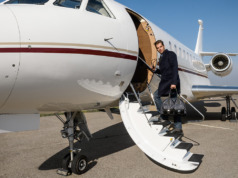
Upon entering the Navy following graduation, I learned of the tradition of awarding the Battle “E” Award as recognition of “Effectiveness”: sustained operational performance and continuous readiness demonstrated by a ship and crew achieved during subsequent qualifying periods of review. This was my first introduction to the concepts of quality assurance and auditing.
All institutions seek recognition for excellence, competency, and service. Quality measures, industry best practices, benchmarking, standards, and regulatory requirements are integral to our working lives. An organization wishing to demonstrate its competence and effectiveness in meeting a particular standard of quality processes will be required, often voluntarily, to be measured against the aspects of that standard.
Within the aviation industry, the FAA is mandated by Congress to ensure a minimum operating standard of safety for the traveling public. For charter operations, this means periodic operational and maintenance inspections. Charter operations must, by regulation, adhere to a set of Operational Specifications (Ops Specs) in order to earn and maintain their charter certificate (FAR Part 135). But essentially, the FAA allows operational excellence beyond these minimum standards to be achieved at the discretion of the operator.
How a charter operation functions within its Ops Specs is left to managerial decisions and the professionalism of the flight crews and maintenance professionals employed therein. While there are many outstanding charter operations in the aviation industry, there are some whose financial and professional practices often are less rigorously implemented.
Individuals and corporate entities may choose to purchase and operate business aircraft under the umbrella of a stand-alone “corporate flight department.” These operations function under the regulatory auspices of FAR Part 91 (General Aviation, not available for hire), whether operated by company personnel or by an aircraft management company. Other than specifically issued letters of authorization, the FAA allows this segment of business aviation to function under essentially the same limited requirements as a small single engine recreational aircraft.
Understaffed and underfunded, the FAA relies upon the discretion and standards of business aviation professionals to provide safe and effective support to the corporations and individuals that employ their services.
Of the more than 4,000 business aviation flight operators in the U.S. alone, why do some chose not to particpate in an audit process? The answer falls into three distinct categories:
“I’m on board with periodic reviews of our organization to continue to improve and learn how we measure up to industry accepted standards.”
- “Audits are expensive and create too much paperwork. We manage a safe operation; we’ve never had an accident.”
- “We run our operation our way and don’t need someone coming in to tell us what they think we are doing wrong.”
- While accident rate statistics show that flight operations within all three of these categories are essentially safe and well managed, the real test should be: “Are you doing everything you can to keep the inherent risks as low as possible in your operation?”
The International Standard for Business Aviation Operations (IS-BAO), an industry safety and best practices program, introduced in 2002, now is used by more than 1,000 flight organizations worldwide.
You may not agree with the philosophy behind its development, or may not use the services of an auditing and conformity oversight service, such as ARGUS, Baldwin Aviation, the VanAllen Group, or Wyvern, among others. But the aviation insurance industry is paying close attention to safety management within its client base, and adjusting its rates accordingly. Whether you operate your own in-house flight department, or charter regularly or occasionally, you are likely to agree that an organization measuring itself against industry best practices, participating in quality improvement, and properly managing the inherent risks of its operation, is one with which you would want to be involved. BAA
Jim Cannon, Business Aviation Safety Consultant, performs safety audits for ARGUS. Recently retired as IS-BAO Program Director for IBAC, he was Home Depot’s Director of Flight Operations, an NBAA Board member, and holds an MBA.




